
On Friday nights, IndieWire After Dark takes a feature-length beat to honor fringe cinema in the streaming age.
First, the spoiler-free pitch for one editor’s midnight movie pick — something weird and wonderful from any age of film that deserves our memorializing.
Then, the spoiler-filled aftermath as experienced by the unwitting editor attacked by this week’s recommendation.
The Pitch: Ain’t It Just Like the Movies to Play Tricks When You’re Trying to Be So Quiet?
As if assembling the greatest songbook in the history of Western music through six decades (and counting!) of nonstop creative growth and experimentation wasn’t enough, Bob Dylan has made a surprisingly large impact on the world of film. In 1966, he helped launch the cinéma vérité movement — and captivated audiences with the mystery of who broke that fucking glass — by allowing D.A. Pennebaker to follow him for the landmark documentary “Don’t Look Back.” Then in 1973 he tried his hand at acting and film scoring for Sam Peckinpah’s under-appreciated Western “Pat Garrett and Billy the Kid,” which just happened to produce the iconic song “Knockin’ on Heaven’s Door.” He won the Academy Award in 2001 when he wrote “Things Have Changed” for the movie “Wonder Boys” — and spent the last two decades playfully hiding the statue on stage at concerts, an honor that none of his 10 Grammys have ever received. And most recently, he teamed up with Martin Scorsese for the semi-fictional meta documentary “Rolling Thunder Revue: A Bob Dylan Story,” which IndieWire recently (and correctly!) named the best music doc of the 21st century.
But for all of his cinematic triumphs — and his misfires like his starring role in “Hearts of Fire,” which produced the worst fake punch I’ve ever seen — only one Bob Dylan film has truly earned the “Midnight Movie” honorific. That honor belongs to “Masked and Anonymous,” the 2003 musical Western comedy that Dylan co-wrote with Larry Charles.
The film, which feels like what might have emerged if the Coen Brothers directed a feature-length adaptation of the Dylan song “Highlands,” ostensibly centers around a jailed rock star named Jack Fate (played by Dylan, whose acting chops are as mediocre as his songwriting is brilliant) who is released on bail to perform a seedy benefit concert as American society collapses around him. But like all great late-career Dylan albums, it’s best described as a vibe that simply washes over you.

The story shifts between music industry satire, political commentary with wildly unclear positions, and dreamlike hallucinations. But it’s really just an excuse to watch Dylan meander like a nervous cowboy while A-list actors chew scenery around him and spit out the kinds of folksy one-liners that would be equally at home in the Poor Richard’s Almanac or the lyrics of “‘Po Boy.” Reasonable people could argue that the soundtrack — which features heavily remixed versions of Dylan’s biggest songs alongside cult favorite deep cuts — is either a brilliant intertextual subversion of Dylan’s public persona or simply the work of a man dicking around for his own amusement. And it’s not immediately clear who would be right.
“Anatomy of a Fall” screenwriter Arthur Harari (who gave the greatest Gotham Awards acceptance speech of all time) and I have one major thing in common: we both love Bob Dylan. No cultural figure has fascinated me half as much as the artist formerly known as Robert Zimmerman, and the study of his 40 studio albums and endless bootlegs has turned into something of a second career for me. I’ve always admired his ability to evolve with time and produce different styles of music in every decade, but my favorite era is undeniably his post-1997 output.
After a tumultuous 1980s that featured towering musical highs (“Every Grain of Sand,” “Jokerman,” “Dark Eyes”) and crushing lows (looking at you “Man Gave Names to All the Animals), Dylan found himself spiraling artistically and rapidly fading from relevance. But everything changed when he released “Time Out of Mind,” his second major collaboration with producer Daniel Lanois that won Album of the Year at the 1998 Grammys. The album saw him tapping into American blues traditions to address more universal themes while simultaneously playing with innovative new studio techniques to create a distinctly macabre brand of distortion. But perhaps more importantly, he embraced the fact that he was an old man who had earned the right to get weird with it.
The creative renaissance that followed “Time Out of Mind” (subsequent albums “Love and Theft” and “Modern Times” are even better) saw Dylan’s lyrics gleefully alternating between profound statements about his looming mortality and stories about late night quests to find hard boiled eggs. His literary mind was as sharp as ever, but he was fully ready to embrace shitposting.
“Masked and Anonymous” is best understood within that tradition. It’s a work of cinematic shitposting by a genius who was both genuinely disturbed about the state of the world and eager to write jokes about Alicia Keys. And while it certainly lacks structural coherence, it washes over you with the same vibes that you can get from listening to “Oh Mercy” late at night.
For a certain breed of Bob Dylan-loving cinephile, it’s an unparalleled delight. It might not be for the casual fan, but if you have an ExpectingRain.com username and a strong take about the best year of the Never Ending Tour, it’s hard to imagine you’ll be anything less than delighted with a movie that features the best deleted track from “Infidels” and John Goodman doing his best Albert Grossman impression. —CZ

The Aftermath: Happy Birthday, You Future Suspicious Person Report!
For reasons unclear to me, I have long confused Bob Dylan and Jimmy Buffet. It’s a mix-up I’m told could spur either of the legendary musicians’ fanbases to angrily chase me through the streets, no doubt hurling slant-rhymed insults and Molotov pitchers of discount margarita at my shameful cheeseburger of a head. (At the risk of actually inciting violence, I’ll further disclose that it was not until I researched “Masked and Anonymous” that I finally realized, no, Bob Dylan did not die last September at the age of 76. Rest in peace, Jimmy, and my apologies to the Parrotheads.)
Suffice to say, the singer-songwriter’s eclectic career is not my area of expertise. But IndieWire’s Christian Zilko — whose birthday just so happens to fall on this Friday night — has become something of a special interest of mine in the year-plus since we met. Our shared love of midnight movies bonded us as colleagues and professional cinephiles, but it’s Zilko’s unfailing ability to surprise me with his bursts of hyper-specific enthusiasm for arcane, borderline annoying subjects that has made him one of my most treasured friends. (I am even more embarrassed to have confused Dylan and Buffet remembering now that Zilko was the one to so gleefully inform me that among Buffet’s last-ever songs was a track titled “My Gummie Just Kicked In.” How could one misattribute such a triumph?)

When we came up with the idea for this column, now in its 29th week (33 installments — counting special editions!), we were carpooling to a work event. It was during that same drive that I became aware of Zilko’s obsession with Dylan. The musical genius is his answer to every conceivable icebreaker question, from “Which celebrity would you want at a dinner party?” to “What subject could you teach a college lecture series in?” To hear Zilko tell it, he’s humoring himself by choosing Dylan and Charles’ chunky, comedic political meditation from 2003 as this week’s After Dark recommendation. As I see it, the spirit of Dylan has been baked into this editorial endeavor from the very beginning.
I can’t say that I explicitly enjoyed “Masked and Anonymous,” although there’s so much going on in the frenetic junkyard of a film that I’d be hard-pressed to dismiss the rattletrap wholesale. The casting of Goodman and Jeff Bridges in an offbeat Western makes it feel like something stuck between the seats of the flaming Gran Torino in “The Big Lebowski,” and I certainly appreciated its hazy, sidling-up-to-the-bar mood and tone. I’ve also got earnest respect for any project that gives not one but two “American Horror Story” goddesses an excuse to flirt with a guy who, I’m sorry to say, looks alarmingly like the polygamist cult leader in HBO’s “Big Love.” (Or like…a dried out Adam Sandler from far away?) Plus, you can’t help but smirk at the clever lines Dylan clearly wrote; “What am I drinking? I’m drinking my life away…” and “Life is like a taxi; even if you ain’t going anywhere, the meter is ticking!” are among my favorites.

Narrative coherence and digestibility aside, this found a special place in my heart because I know how much Dylan means to Zilko. The midnight movie space is made for enthusiasts and “Masked and Anonymous” gave me more than enough to get excited about, particularly on the research front. Knowing so little about the songwriter/screenwriter (for the record, I was familiar with his music, just not his life!), I took this week’s assignment as an excuse to dive deep on the “Blood on the Tracks” visionary. It’s easy to see why Zilko idolizes him; Dylan’s willingness to experiment and provoke mirrors much of what I know about my friend’s taste and style as a critic. More importantly, there’s a spiritual shagginess to both dudes — and Jimmy Buffet! — that’s commensurate.
In 2009, a disheveled man was spotted roaming through a New Jersey neighborhood in the rain, scrutinizing houses. Police were called, picked him up, and accepted that it was in fact Dylan, in town for a concert, only when his manager showed them his passport. That’s the kind of fate I can easily envision for Zilko: a grab-bag art weirdo, out wandering the universe in search of singular sights, sounds, and possibly a decent rental property. (Read our “Event Horizon” write-up; he has a thing for architecture!) “The way we look at the world is the way we really are…” That’s another killer “Masked and Anonymous” line, proved out by the life and wisdom of my friend, the Bob Dylan freak. Call me when you need bail, buddy; I’ll handle the comeback tour any day. —AF
Those brave enough to join in on the fun can stream “Masked and Anonymous” for free with ads on Tubi. IndieWire After Dark publishes midnight movie recommendations at 11:59 p.m. ET every Friday. Read more of our deranged suggestions…
- New Year, New You! Shock Your System with the Grotesque Fairytale of ‘Taxidermia’
- Happy New Year! ‘Terror Train’ Dares to Ask Whether Dying Is Preferable to Watching a Bad Magic Show
- ‘Rudolph’s Shiny New Year’ Is the Bouillabaisse of Holiday Strangeness to Cure Your Post-Christmas Hangover




